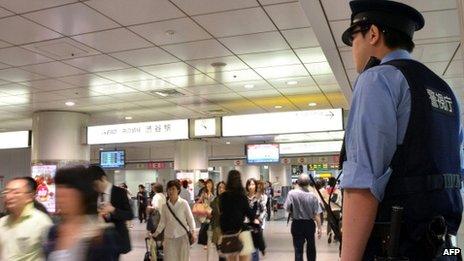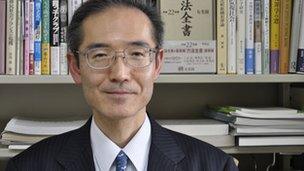Japan crime: Why do innocent people confess?
- Published

Japan has a conviction rate of more than 99%. But in recent months there has been a public outcry over a number of wrongful arrests where innocent people confessed to crimes.
It started with a threat posted on the city of Yokohama's website in late June: "I'll attack a primary school and kill all the children before the summer."
In the months that followed, there were a number of similar threats posted on the internet - some threatening famous people, including the Emperor's grandchildren.
After a police investigation, four people were arrested. Two, including a 19-year-old student, confessed while in custody.
But on 9 October, the real perpetrator sent an email to a lawyer - Yoji Ochiai - and local media, explaining how he or she made those threats by taking control of innocent internet users' computers with a virus.
His or her purpose, as stated in the email to Ochiai, was "to expose the police and prosecutors' abomination".
And in a way, it did. It raised the question - why did the innocent people confess to a crime that they didn't commit? What kind of pressure were they put under?
"I was surprised to have received the email but I wasn't surprised that the innocent people confessed," says Ochiai.
There have been a number of wrongful convictions in the past, he says.
"But unlike other cases, the fact that these cyber threat incidents happened to ordinary people who were just using the internet raised the fear that it could have happened to anyone," he adds.
When Ochiai posted the email on his Twitter account and blog, he received hundreds of responses from the public - most of which were more critical towards the police than the real perpetrator.
Shoji Sakurai spent 29 years in jail for a robbery-murder that he didn't commit. It took him another 15 years to win a not-guilty verdict at his retrial last year.
"I was a bit naughty when I was young and the Japanese police go after people with criminal records, so my friend Sugiyama and I became prime suspects for the murder."
When arrested, aged just 20, he was treated like a guilty criminal, he says.
"They interrogated me day and night, telling me to confess. After five days, I had no mental strength left so I gave up and confessed."
"It may be difficult for people to understand, but being denounced repeatedly - it is harder than you think," he adds.
Sakurai says his interrogators weren't aggressive but there have been cases in which the police or prosecutors are alleged to have treated their suspects badly.
Hiroshi Ichikawa was a prosecutor for nearly 13 years - until he lost his job for threatening to kill a suspect during an interrogation.
"I am not trying to make an excuse for my behaviour by saying that others did the same, but I don't think I was some kind of a monster in making a death threat to a suspect," he says.
"I have overheard other prosecutors yelling at suspects and one of my bosses boasted how he kicked the shin of a suspect underneath the desk."
Another thing he regrets - aside from making the death threat - is writing up a confession statement which did not correspond with the truth.
"After I grilled the suspect for eight hours, I got him to sign this statement even though he didn't say a single word of it," he says.
"My boss was pressuring me to get his confession so I thought I couldn't go home without it."
For Ichikawa, it didn't matter if it was true or false as long as he had the confession.
The fact that he lost his job for threatening to kill a suspect suggests that regulations governing interrogations are working.

But while the Japanese police and prosecutors are not widely accused of resorting to more aggressive forms of interrogation such as torture, no-one outside the small interview room really knows what happens inside because suspects' interviews take place behind closed doors - without an attorney.
So why does the Japanese justice system prize confessions so much?
"It is the king of evidence. If you can get someone to confess to a crime, the court is going to find them guilty," says Jeff Kingston of Temple University in Tokyo.
Japan has a conviction rate of over 99%, most of which are secured on the back of a confession.
"It is also seen as a chance given to a suspect to unburden his guilt and repent for his crimes."
If a suspect repents during the interrogation process, Professor Kingston says, prosecutors offer a lighter sentence.
Yoshiki Kobayashi, who worked as a detective for the National Police Agency for 25 years, thinks the emphasis on confessions is also due to limited investigative powers that they have.
"The police in other countries can have plea bargaining, undercover operations and wire-tapping, so they rely on these techniques. In Japan, we are not allowed these powers so all we can do is to rely on confessions."
Their limited power is due to historical reasons. Before World War II, says Kobayashi, the police abused their powers so people demanded that they give them all up after the war.
"In the US or other countries, they regard investigation as a game but in our culture we also want to find out the truth - exactly what happened through confessions," he says.
But what makes Japanese suspects eager to confess - even to a crime that they didn't commit?
Lawyer Yoji Ochiai thinks it has something to do with the Japanese psyche.
"People traditionally thought that they shouldn't stand up against authorities so criminals confessed quite easily," he says.
"But in the 21st Century, more people - guilty or not - are exercising their rights and wouldn't simply obey and confess."
"The authorities still try to extract confessions using the same methods and that's why they end up pressuring suspects to confess which may have resulted in untruthful confessions," he added.
Japanese society's emphasis on shame and consideration towards their family also plays a role.
Sakurai says he was told that his mother suggested he confessed - he doubts this but cannot ask her as she had passed away before he was freed.

Shoji Sakurai, pictured here with his wife, spent 29 years in prison for a crime he didn't commit
The father of the 19-year-old student who confessed to June's cyber threat said in a statement to the media that consideration to the family was what motivated his son to "misrepresent the fact and confess".
Even if those who have been wrongly convicted managed to prove their innocence, receiving an official apology has been nearly impossible.
Sakurai did receive 12,500 yen ($148) a day for the duration of his detention. He is now suing the state and is seeking more compensation.
"The money doesn't bother me and it's not even an apology that I want, but I want to change the system which allows the police, prosecutors and judges to put away innocent people and get away with it."
Some changes to the system are already happening - since July, some parts of suspects' interviews have been recorded, but critics are demanding full recording of all interviews.
For many decades, Japan's criminal justice system has had a near squeaky-clean image. As well as a conviction rate of over 99%, only 1.4% of people reported falling victim to assault according to the latest annual figures from the Organisation for Economic Co-operation and Development, external, a figure lower than the OECD average of 4%.

Japanese prisons are known for their strict discipline
The Justice Ministry says most of the confessions are truthful and they play an important part in convicting criminals. When you ask people on the street they say they still trust the police, with an average score of seven out of 10.
But the statement released by the father of the student wrongfully arrested over cyber threats is damning of the system to say the least.
"The police are supposed to protect the public. It is impermissible that they arrested and laid a false charge against an innocent citizen, just a young boy, due to their negligent investigations," he wrote.
"It is too much to bear when I think about what went through his mind [when he confessed] - how he was longing for evidence of his innocence but he had to give up."
"The saddest thing is I as a parent even doubted his innocence."
Meanwhile the perpetrator of the cyber threats has still not been caught.
Mariko Oi's World Service investigation for Assignment is broadcast on 3 January. Listen via iPlayer or download a podcast.